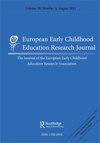Embracing the breadth of ethical complexities in early childhood research
IF 1.4
4区 教育学
Q2 EDUCATION & EDUCATIONAL RESEARCH
European Early Childhood Education Research Journal
Pub Date : 2023-03-04
DOI:10.1080/1350293X.2023.2208469
引用次数: 2
Abstract
Ethics within the field of early childhood education and care (ECEC) is all-encompassing; it is embedded within the very fabric of our profession, as well as needing specific consideration within our research. The strong connection between practice and research within ECEC is long established and, in my view, ethics sits at the nexus of this. EECERA, since its inception 32 years ago, has championed ethical practices within research, pedagogy and policy with young children. As educators of the youngest within society, our work holds the deepest respect for children, their families and wider communities and we seek inclusion and democracy. As a sector, we support social justice and equality. As researchers with the youngest children, we seek to uphold the same ethical standard and more. We ensure that our research is valuable to the wider sector, reflects multiple voices and has been undertaken with integrity. Specifically, EECERJ champions the work of researchers who listen to the youngest children in our society and this journal has been instrumental in guiding my ethical compass as I undertake research. The EECERA ethical code (Bertram et al. 2015) provides invaluable support through eight ethical principles and specific research practice and publication guidance; this code illustrates the breadth of ethical considerations that should impact and influence a research design. As well as providing support, the EECERA code illustrates the complexity of undertaking research within the ECEC field. Such complexity cannot and should not be underestimated and, where researchers illuminate their ethical decisions and make transparent their research processes, we find that we can all learn from their journey. My understanding of the complexity of ethics continues to grow with every research project and increasingly I find that a flexible and contextual approach is required. This is far removed from my initial view of ethics in my earliest days of post-graduate study. The ethics of research can all too often be reduced to a single form and a checklist of requirements. Whilst I agree that obtaining approval for research to be carried out is an essential element, I believe strongly that an ethical approach stretches far beyond a single statement of intent. An ethical approach to research guides every choice we make from our intent to research to our engagement in dissemination. Ethics permeates the literature we chose to review and our positionality as we research as well as taking its typical place within methodological considerations. Obtaining approval to undertake research is essential, and through the papers within this issue, you will find authors who note where approval was granted. Whilst undeniably important, this aspect of research often becomes problematic for researchers within ECEC as invariably the system of approval will be generic and may not appreciate the complexity of our sector. Children are often viewed as vulnerable and in need of protection, and their participation is always mediated by adults. Parental consent is a requirement before the voice of the child can be heard and adults act as gatekeepers regarding access to settings. Whilst these safeguards are essential, we need to recognise that they perpetuate the view of the vulnerable child and do little to ensure children are heard within research. Equally, the system of obtaining approval assumes that the researcher is in a position of power and wishes to control each aspect, and method, within the enquiry. There is little scope to allow research participants接受幼儿研究中伦理复杂性的广度
幼儿教育和护理领域的伦理是包罗万象的;它嵌入了我们专业的结构中,也需要在我们的研究中进行具体考虑。欧共体内部的实践和研究之间的紧密联系由来已久,在我看来,伦理学是这一联系的核心。EECERA自32年前成立以来,一直倡导幼儿研究、教育和政策中的道德实践。作为社会中最年轻人的教育工作者,我们的工作对儿童、他们的家庭和更广泛的社区怀有最深切的尊重,我们寻求包容和民主。作为一个部门,我们支持社会正义和平等。作为研究最小孩子的研究人员,我们寻求坚持同样的道德标准,甚至更多。我们确保我们的研究对更广泛的行业有价值,反映了多种声音,并以诚信的态度进行。具体来说,EECERJ支持研究人员的工作,他们倾听我们社会中最小的孩子的声音,这本杂志在我进行研究时对指导我的道德指南针起到了重要作用。EECERA伦理准则(Bertram等人,2015)通过八项伦理原则、具体的研究实践和出版指南提供了宝贵的支持;该准则说明了影响和影响研究设计的伦理考虑的广度。除了提供支持外,EECERA代码还说明了在ECEC领域进行研究的复杂性。这种复杂性不能也不应该被低估,当研究人员阐明他们的道德决策并使他们的研究过程透明时,我们发现我们都可以从他们的旅程中学习。随着每一个研究项目的开展,我对伦理学复杂性的理解都在不断加深,我越来越发现需要一种灵活的、有针对性的方法。这与我研究生学习初期对伦理学的最初看法相去甚远。研究伦理往往可以简化为一种形式和一份要求清单。虽然我同意获得批准进行研究是一个重要因素,但我坚信,伦理方法远远超出了单一的意向声明。研究的伦理方法指导我们做出的每一个选择,从研究的意图到传播的参与。伦理学渗透到我们选择审查的文献中,渗透到我们研究的立场中,并在方法论考虑中占据典型地位。获得进行研究的批准是至关重要的,通过本期的论文,你会发现作者注意到批准的地方。虽然不可否认的重要,但这方面的研究对欧共体的研究人员来说往往会遇到问题,因为审批系统总是通用的,可能不会意识到我们行业的复杂性。儿童往往被视为弱势群体,需要保护,他们的参与始终由成年人调解。在孩子的声音被听到之前,父母的同意是一项要求,而成年人则是访问设置的看门人。虽然这些保障措施至关重要,但我们需要认识到,它们延续了弱势儿童的观点,对确保儿童在研究中被倾听几乎没有作用。同样,获得批准的系统假设研究人员处于权力地位,并希望控制调查中的每个方面和方法。几乎没有允许研究参与者参与的空间
本文章由计算机程序翻译,如有差异,请以英文原文为准。
求助全文
约1分钟内获得全文
求助全文
来源期刊

European Early Childhood Education Research Journal
EDUCATION & EDUCATIONAL RESEARCH-
CiteScore
4.20
自引率
8.70%
发文量
70
期刊介绍:
The European Early Childhood Education Research Journal (EECERJ) is the publication of the European Early Childhood Education Research Association (EECERA), an international organisation dedicated to the promotion and dissemination of research in Early Childhood Education throughout Europe and beyond. CREC is the UK base for the European Early Childhood Research Association. EECERA welcomes and encourages membership and contributions from across the world to share and participate in its European perspective. EECERJ aims to provide a forum for the publication of original research in early childhood education in Europe.
 求助内容:
求助内容: 应助结果提醒方式:
应助结果提醒方式:


